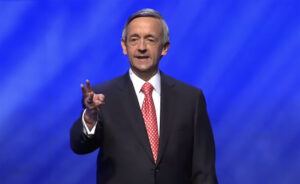Robert Jeffress says IRS investigated his church
DALLAS (RNS)—President Donald Trump told reporters on April 17 multiple pastors who gathered for a White House Easter service had complained about being investigated by the IRS over the past four years.
“They said, ‘Sir, I was targeted by the IRS, and the FBI came in, sir, and I’ve been going through hell for years,’” Trump said in a discussion in the Oval Office about his threat to revoke the tax-exempt status of Harvard University.

Religion News Service reached out to the pastors who attended the service to corroborate Trump’s account. Most did not immediately respond, but Pastor Robert Jeffress, pastor of First Baptist Church in Dallas, confirmed in an email he told Trump at the event his church had been investigated by the IRS.
“I told the President that our church was the subject of an IRS investigation launched under the Biden administration that spanned several years and cost hundreds of thousands of dollars due to complaints from the Freedom From Religion Foundation,” Jeffress wrote. “The case was ultimately resolved in our favor.”
For years, advocates for the separation of church and state have urged the Internal Revenue Service to hold churches that endorse political candidates accountable. They insist such endorsements violate a provision of the U.S. tax code, known as the Johnson Amendment, that bars nonprofits from taking sides in electoral campaigns.
Little has come of those concerns, as the IRS has long been reluctant to investigate churches.
Asked for documentation proving the investigation occurred, Jeffress said his church is turning all of the documentation regarding the investigation over to the White House, adding, “Any release of that information will come from them.”
The White House did not immediately provide documentation when asked by RNS, saying they were looking into the matter.
Verifying the investigation without documentation may prove difficult. Asked about the alleged investigation, a representative for the IRS said federal employees are barred from disclosing tax return information, “including whether the agency has or has not investigated a particular entity.”
Focused on ‘Celebrate Freedom Sunday’ remarks
According to the Freedom From Religion Foundation, the group filed a complaint about First Baptist in July 2020, before the election and while Trump was still president.

Pastor Robert Jeffress introduces then-Vice President Mike Pence during “Celebrate Freedom Sunday” at First Baptist Church in Dallas on June 28, 2020. (Video screen grab)
It focused on a visit by then-Vice President Mike Pence made to First Baptist for a “Celebrate Freedom Sunday.” Jeffress said he was praying Pence would have a second term as vice president and then be elected president.
“Mr. Vice President, I know I probably should not say this, but my congregation knows that has never stopped me before,” said Jeffress, according to a recording of the service posted on First Baptist’s YouTube channel.
“We are praying that when you finish your term in 2024, we don’t want you moving out of the West Wing. We just want you moving down the hall a few doors and continue to build on the legacy of the most faith-friendly president in history.”
The Freedom From Religion Foundation asserted Jeffress’ remarks amounted to an endorsement.
Repeated attempts to produce a test case
Only one congregation in recent history has lost its exemption for electioneering—an upstate New York church that took out anti-Bill Clinton ads in several large newspapers in 1992.
It has not been for lack of trying. For years, secular advocacy groups have complained about events such as “Pulpit Freedom Sunday,” a campaign involving thousands of pastors in which they endorse candidates from the pulpit and send recordings of their sermons to the IRS, hoping to produce a test case to overturn the Johnson Amendment.
The Alliance Defending Freedom, a Christian legal group, organized the Pulpit Freedom campaign for years but eventually gave up.
Madeline Ziegler, a staff attorney for the Freedom From Religion Foundation, said the organization filed about 30 complaints about alleged violations of the Johnson Amendment. Each time, Zielger said, the organization received a form letter in response.
“They always explain they cannot disclose whether they have started an investigation or the status of any investigation,” Ziegler said.
Ziegler shared a letter from the IRS, dated August 29, 2020, acknowledging receipt of the Freedom From Religion Foundation complaint.
“The IRS has an ongoing audit program to ensure compliance with the Internal Revenue Code,” the letter read. “We’ll consider the information you submitted in this program.”
Such letters may not be as rare as prosecutions. Attorneys for New Way Church in Palm Coast, Fla., claimed earlier this month the IRS had launched an investigation against the church after a local school board candidate spoke at the church in 2022 and explained why she was running for office. The church’s pastor prayed for the candidate, New Way attorneys claimed in a statement.
“We have some questions about your tax-exempt status as a church under Internal Revenue Code (IRC) Section 501 (a) and/or your liability for tax,” read a 2024 letter from the IRS. “Our concerns are based on information we are in possession of indicating you may have conducted political campaign activities which are prohibited under IRC Section 501 (c) (3).”
The letter instructed the church to fill out a “Church Tax Inquiry Questions” form.
Lawyers from the First Liberty Institute say the investigation later was closed.
“We are pleased that the IRS not only closed its investigation, but affirmed that this church’s activities of praying for political candidates during its church service do not threaten its tax-exempt status,” Jeremy Dys, senior counsel for First Liberty Institute, said.
Earlier this year, the National Religious Broadcasters filed a federal lawsuit to overturn the Johnson Amendment. That lawsuit claimed nonprofit newspapers are allowed to endorse candidates, but churches are not.